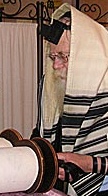The Sages have said that Torah is the most eminent of the mitzvot, even greater than prayer.
And prayer is considered powerful enough to make “combinations” that can influence the forces in the higher worlds.
On the other hand, Halachah dictates that even if one is studying Torah one has to stop for prayer.
But after all, if one is engaged with the Divine word itself, why does one have to be compelled to speak with God on a possibly lower level?
The answer is that the Halachic ruling is for those who do not study all the time, for those who do other things besides study.
It is not for those who, like Rav Yehudah, ceased studying Torah only once a month to pray.
At such a level of conscious enjoyment in Torah, a person can begin to comprehend the awe, the exultation, and the sublimity of what he is doing.
It also sheds light on the ultimate human question: “What am I doing here?”
The definition of one’s task on earth, in itself, raises the problem of lower and higher obligations, Torah being one of the higher obligations, higher than other mitzvot.
On the other hand, the basic mitzvot are not to be easily pushed aside in favor of study.
There is a complex relationship between them and it involves a proper evaluation of what a person is capable of accomplishing.
–Rabbi Adin Steinsaltz

